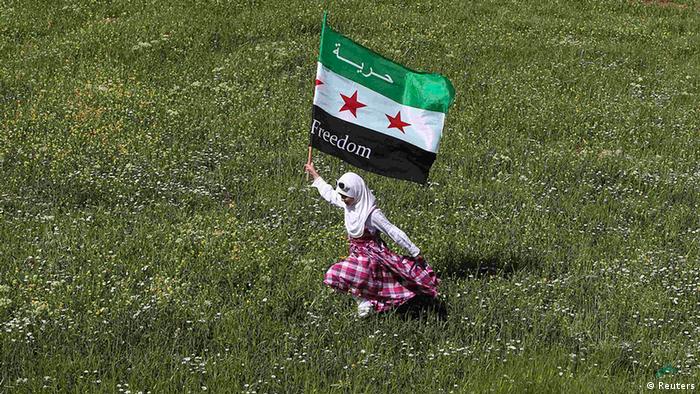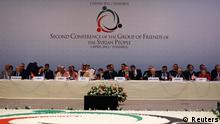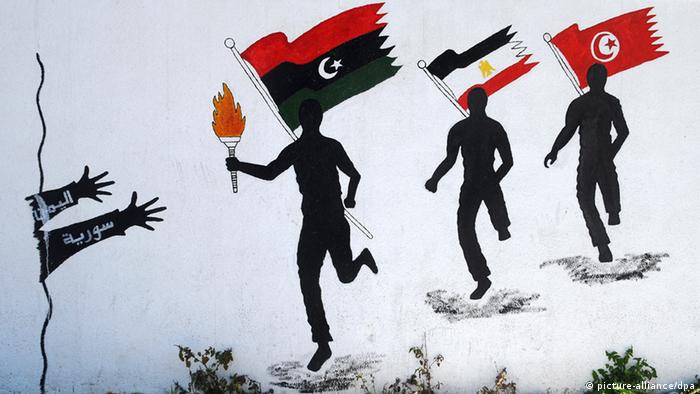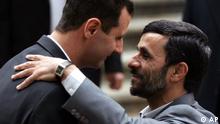Ideas abound for post-Assad Syria – By Kersten Knipp
18 April 2012

The fighting continues in Syria, despite a UN peace plan. But initial ideas for the country’s future after the violence stops are in the making. Many changes are imminent, though some thorny policy issues will remain.
UN observers are still in the process of negotiating with the Syrian regime – grappling for a protocol to regulate the modalities of their mission. A few more days are likely to pass before it is signed. Based on the bloodshed still occurring since the UN peace plan came into effect, many more people will die in this time. Since President Bashar Assad’s regime announced it would accept the plan by UN envoy Kofi Annan, some 25 people have been killed daily, according to figures by the Syrian National Council (SNC).
Nonetheless, the SNC is already planning for the post-Assad era. According to SNC member Ausama Monajed, executive director of the London-based Strategic Research and Communication Center, the most important task is to continue campaigning for an international intervention. Even so, the opposition is already thinking about what will happen after the conflict has ended.
Monajed said the economic aid pledged by the international Friends of Syria group at their meeting in Istanbul on April 1 was an « encouraging signal. » The group was aware of the political and economic challenges Syria faced in a transition period, it said in its final declaration. The group said it therefore endorsed the mandate for the working group on Syria’s economic recovery and development. It aims to be a central forum of the international community for planning and coordinating aid. The working group is jointly led by Germany and the United Arab Emirates.
Equality for all, without discrimination
The plans for the period after the violence ends are however, not too concrete as yet. This is also the case the national reconciliation pact, which the SNC is promoting. It sees South Africa as a role model, Monajed said. The experiences there after the end of apartheid are an example to follow in Syria.

Some 80 countries belong to the Friends of Syria group
In the long-term, this work is supposed to flow into a new constitution and efforts are already underway on its formation. « This includes above all the people’s equality in the eyes of the law, » Monajed said. « In addition, discrimination based on gender, religion or other characteristics will be penalized. With this, we want to prevent possible later acts of revenge. »
No change toward Israel
In terms of foreign policy, Syria will embark in part on a new course, but will to some extent also continue that of the Assad regime. The Assad regime had in principle spoken out in favor of peace in the Middle East, said Günter Meyer, head of the Germany-based Center for Research on the Arab World in Mainz. But not under those conditions fundamentally dictated by Israel and the United States, he added.
« This means as long as Israel continues its settlement construction in the occupied territories, Syria will be unwilling to agree to peace negotiations with Israel, » Meyer said.
On this and other issues, Assad still has some public backing, for example his support for the Palestinians. In this regard, the Syrians represent the position of most people in the region.

The flame of freedom has reached Tunisia, Egypt and Libya, but not Syria
« If we look at the reactions of various political parties in Egypt, Tunisia or Libya, we observe that the Syrians follow the same perceptions as do the largest share of the populations in these countries, » Meyer said.
This also means that the relationship between a new Syria and Israel would involve little change. The Golan Heights region between the two countries which is occupied by Israel is likely to be the main point of contention.
« These must be returned to Syria in accordance with several UN resolutions, » Monajed said. « For this reason, Syria will have its own negotiator for this issue – one who has the support of the entire country, as he will be democratically legitimized. He will know that the will of the entire Syrian population is behind him. »
New relations with Iran and Hezbollah
The relationship with Iran, on the other hand, is likely to change. According to Monajed, the government in Tehran has supported Assad’s regime with weapons, expertise and personnel.
« This will certainly play a role in the organization of future policy, » he said. Syrians will also hardly forget the role of Lebanon’s Hezbollah, who have stood by Assad during the revolution.
« Syria’s stance on destructive alliances and destructive elements in the region like Hezbollah and others will be different, » Monajed said.

Syria and Iran share close ties
But the country first has to leave the violence behind before contemplating radical policy changes. This is not likely to be an easy task, Meyer said. The sole possibility to bring peace to the country is the direction proposed by the Annan plan, he said. Only an inner-Syrian solution is realistic which includes all Syrian groups with their diverse interests.
Divided opposition
The problem is in fact that the Syrian opposition does not form a uniform bloc, Meyer said. On the one hand, there is the inner-Syrian opposition, which mainly consists of 13 predominantly left-wing parties. On the other hand there is the Free Syrian Army made up mainly of army defectors. It is banking on the support from Qatar, Saudi Arabia and Turkey, and its goal is to violently topple the regime. But if the UN mission can manage to reduce the fighting and bring together the most important groups for negotiations, a peaceful transition may be possible.
If the mission fails it could have catastrophic consequences. The conflict between Sunnis and Shiites, for example, could become even worse.
« This could pull the entire Middle East into a conflict which escalates even further, » Meyer said.
Author: Kersten Knipp / sac Editor: Rob Mudge